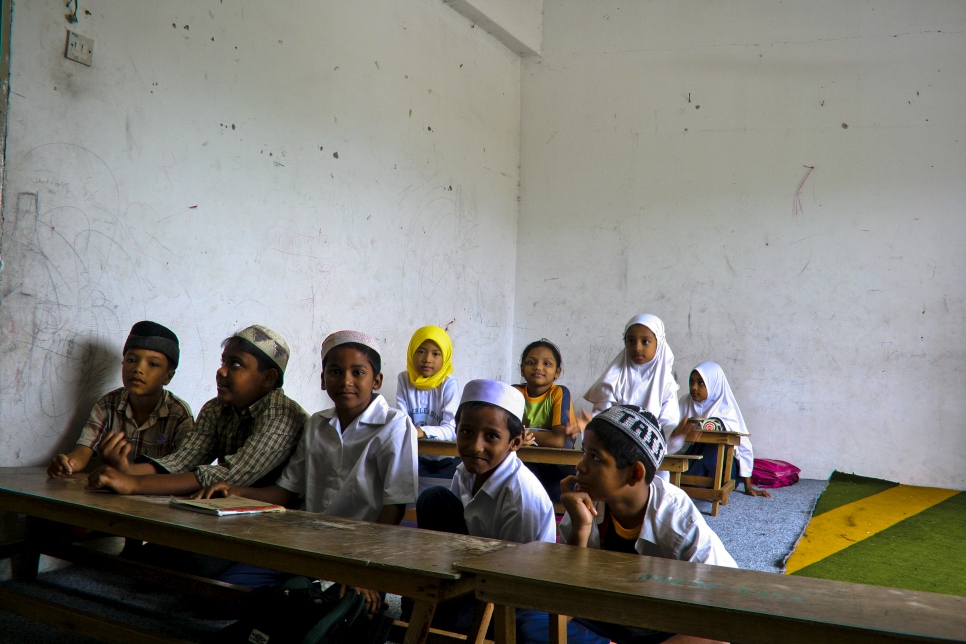Refugee School Adoption Programme
Refugee education in Malaysia
The refugee children who have access to education in Malaysia attend either education projects run by UNHCR and NGOs, or community-based education classes that are organised by the refugee communities themselves.
UNHCR partners with Non-Governmental Organisations to run structured education projects for refugee children. There are eight of such projects and only 20% of refugee children in school benefit from these projects.
Therefore, this means that 80% of refugee children who access any kind of education programmes are attending community-based schools which are often run in resource-scarce conditions.
Community-based schools are education classes that are run by the refugee communities themselves, with some support from the public. These community-based schools are located within the refugee population, wherever there are refugee communities with a large number of children of school-going age.
- According to information gathered from the refugee communities, at least 70 such schools are located in Kuala Lumpur and Selangor. Some 4,000 refugee children attend such schools.
- The scope and reach of these classes are largely restricted by a lack of resources, including qualified teachers. Classes are usually held in rented flats or shop houses, where rooms are converted into classrooms, and are largely overcrowded, lacking in basic teaching facilities and with no space for children to play.
- Children accessing these schools are from the lower primary school age group. Most adolescent children drop out of school to work in order to supplement their family's income.
Education remains one of the most important concerns for refugee parents. It is the hope they have that their children will have a chance for a better life.
Adopt a refugee school: What does it mean?
Adopting a refugee school means a donor supports a particular community-based school in one or more areas of need for a specified duration of time.
- Concerned donors, corporate entities, social organisations and indviduals are invited to extend their expertise, services or resources to address the unmet needs of refugee children in the area of education.
- Support can be in the form of financial contributions or in-kind resources.
- Donors can choose to support any existing community school of their choice from the list of schools known to UNHCR, or even extend help towards the setting up of new community schools in under-served areas.
- The types and extent of assistance will be decided following agreement made among the donor, the refugee school and UNHCR. This support is delivered directly by the donor to the community-based school.
- Donors may choose to support one entire school and as many of its needs as possible, or a specific area of need in several schools.
- UNHCR recommends that a commitment of support for a minimum duration of one year be considered by donors.
Areas to support
Each individual school has varying levels of need for assistance. The areas of support generally required by these schools include:
Financial sponsorship: Financial donations of up to RM12,000.00 or more can be channeled through UNHCR towards the development of new community-based schools or to boost support to existing schools. This will be coordinated through UNHCR's Social Protection Fund.
Support for the physical infrastructure or needs of the schools, including:
- Renovation and the improvement of school facilities
- School furniture such as tables, chairs, whiteboard
- Stationary for the students
- Computers and software
- Cost-sharing of rental fees
- Setting up a library, including books and shelves and reading/story corner and other audio-visual learning aid
- Cost-sharing for transportation for the stutents to attend school
- Teacher support, including: cost-sharing of teachers' stipend, teacher training in subjects for the class, teacher training in languages, teaching aid equipment, and providing support in terms of volunteers to help teach and conduct other activities for the students
- Youth and Child development programmes, including: nutrition programmes in school to provide one healthy meal for the students during the school day and health education for students, tutoring and mentoring programmes for young people, language and skills training, computer training, and non-school activities such as outings, art, sports, theatre, music.
To know more about how to adopt a refugee school, contact us.

